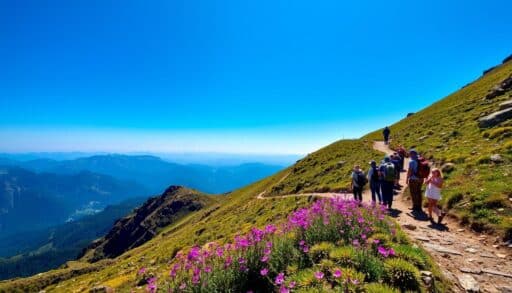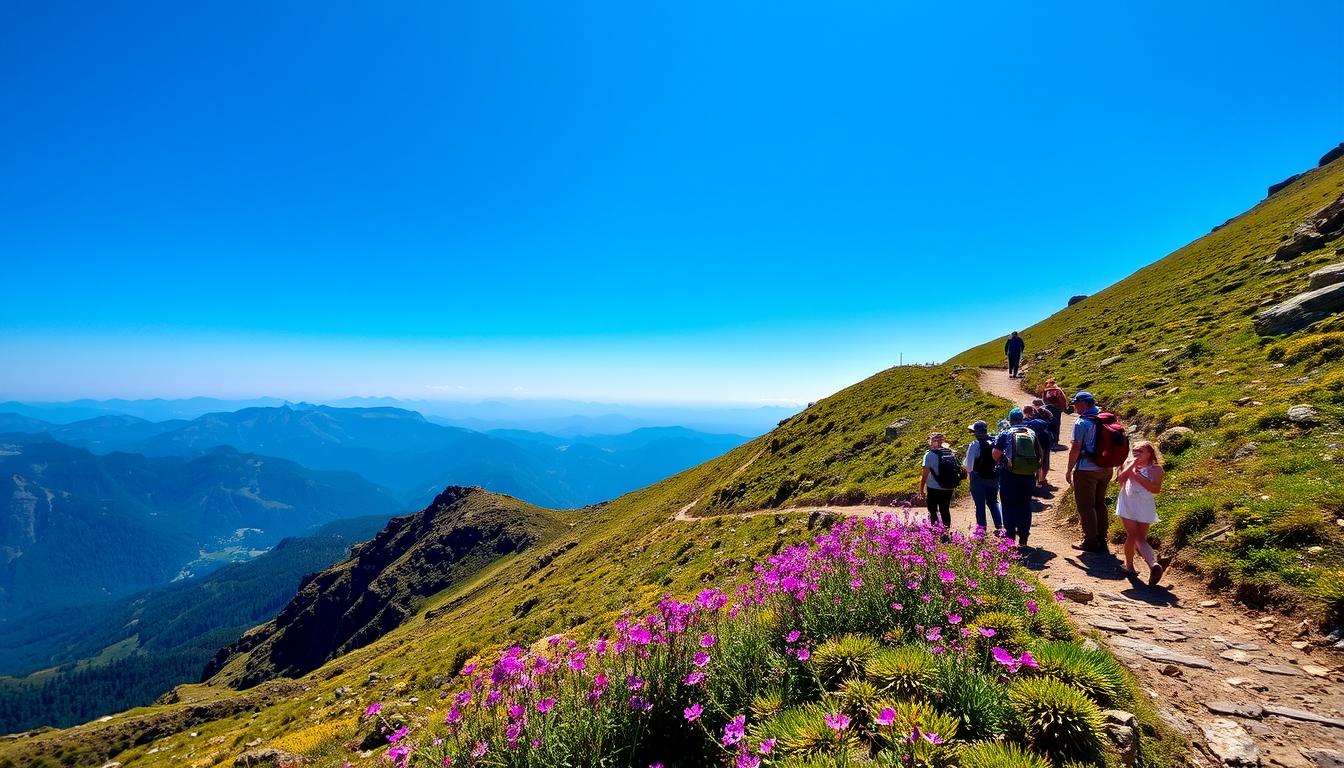Adventure travel is a thrilling way to see the world. It mixes physical activity, cultural exchange, and nature. Unlike regular sightseeing, it lets you really feel a place and connect with locals. It’s about real, unique experiences that make you step out of your comfort zone and remember forever.
Imagine trekking the Andes, cycling through the countryside, or visiting remote villages. Adventure travel is all about discovering new things and growing as a person. It’s not just about seeing places; it’s about the journey itself. It changes you, leaving you with memories that last a lifetime.
Key Takeaways
- Adventure travel combines physical activity, cultural exchange, and immersion in nature.
- Adventure travelers seek authentic, off-the-beaten-path experiences that push them outside their comfort zones.
- Adventure travel offers a sense of discovery and personal growth that sets it apart from traditional tourism.
- Adventure travel can inspire, challenge, and transform travelers, creating unforgettable journeys.
- Adventure travel encompasses various types of travel, including ecotourism, experiential travel, and foodie travel.
The Definition of Adventure Travel
The Adventure Travel Trade Association defines adventure travel as “a tourist activity that includes physical activity, a cultural exchange, or activities in nature”. This definition covers a wide range of experiences. It includes thrilling “hard adventures” like whitewater rafting and mountain biking. It also includes more laid-back “soft adventures” like hiking and kayaking.
Experiential travel is also a part of adventure travel. It involves immersing oneself in local culture through activities like culinary tours and community-based tourism. The key idea is to step outside your comfort zone, explore new places, and connect deeply with the destination.
Types of Adventure Travel
Adventure travel falls into two main types:
- Hard Adventure – These activities are thrilling and often require special skills and physical effort. They include whitewater rafting, rock climbing, and mountaineering.
- Soft Adventure – These activities are more relaxed and let you explore nature and culture. Examples are hiking, kayaking, and wildlife viewing.
Both types of adventure travel aim to connect you with the natural and cultural settings of your destination. They often involve ecotourism and cultural exchange opportunities.
| Type of Adventure Travel | Examples | Characteristics |
|---|---|---|
| Hard Adventure | Whitewater rafting, rock climbing, mountaineering | Adrenaline-fueled, require specialized skills and equipment, higher risk |
| Soft Adventure | Hiking, kayaking, wildlife viewing | More relaxed and accessible, focus on experiencing nature and culture |
“Adventure travel is any experience that takes you just beyond your comfort zone to maximize wonder, discovery, and potentially transformation.”
– Journeys International
Adventure Travel Activities
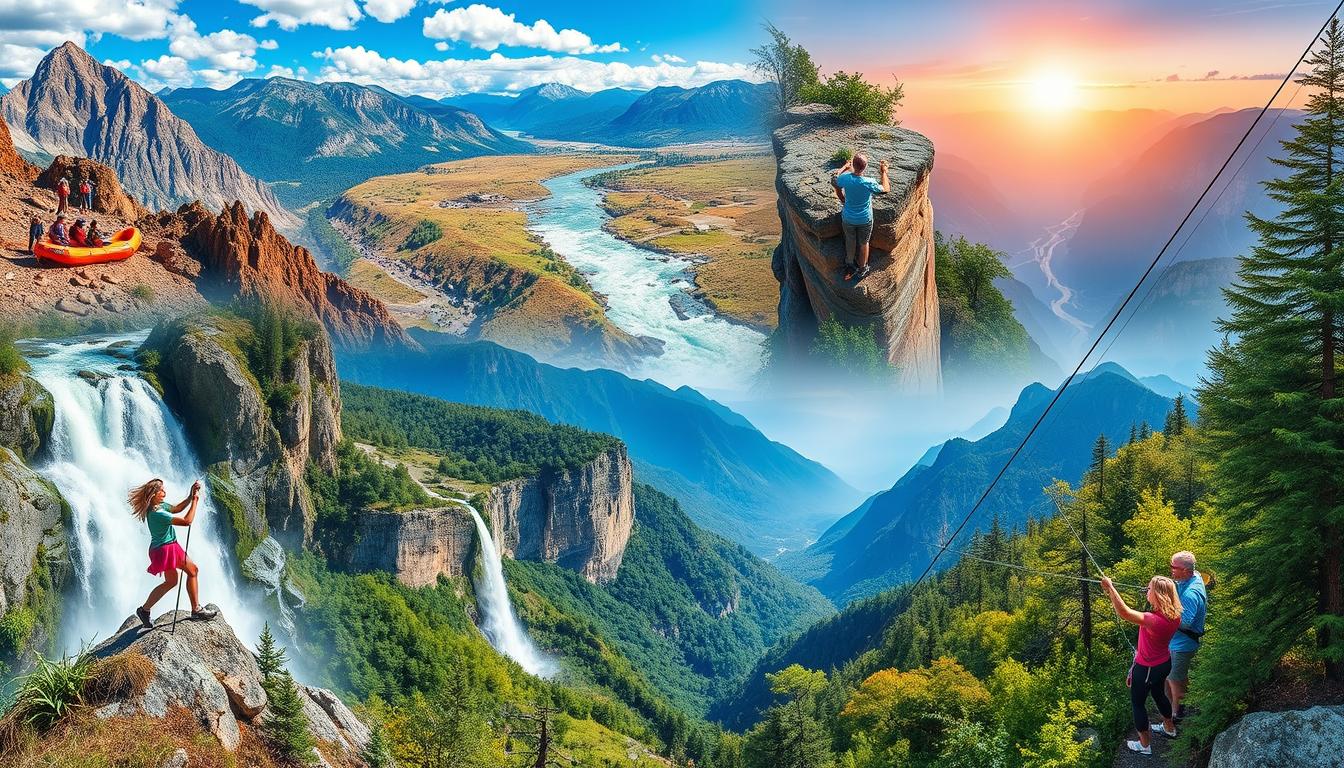
Adventure travel is all about exciting activities that let you dive into your surroundings. It ranges from thrilling “hard adventure” activities to more laid-back “soft adventure” options. There’s something for everyone in the world of adventure travel.
For those who love a rush, biking, hiking, kayaking, and more are great choices. These activities need good physical shape and skills. They offer a thrilling way to see the outdoors. Mountain biking, for example, is becoming very popular, giving a unique view of nature.
For a more relaxed adventure, try backpacking, e-biking, or culinary tours. These activities let you connect with nature and culture in a deep way. They’re perfect for those who want to learn about local communities and traditions.
Experiential travel, like heritage tours and market visits, is also growing. These experiences let you dive into a place’s history and culture. You get to see how locals live, with the help of local experts.
| Adventure Travel Activity | Description |
|---|---|
| Biking | Exploring destinations on two wheels, ranging from leisurely rides to challenging mountain biking trails. |
| Hiking | Trekking through stunning natural landscapes, from day hikes to multi-day backpacking expeditions. |
| Kayaking | Paddling through serene waterways, including rivers, lakes, and coastal areas. |
| Whitewater Rafting | Navigating through thrilling rapids on a guided rafting adventure. |
| Canyoneering | Exploring canyons and gorges through a combination of hiking, climbing, rappelling, and swimming. |
| Zip-lining | Gliding through the air on suspended cables, often over scenic landscapes. |
| Backpacking | Carrying all necessary gear and camping equipment on multi-day hiking adventures. |
| E-biking | Exploring destinations on electric-assisted bicycles, providing a more accessible way to cover greater distances. |
| Culinary Tours | Immersing oneself in local cuisine through hands-on cooking classes, market visits, and dining experiences. |
| Homestays | Staying with local families to gain a deeper understanding of their culture and way of life. |
| Heritage Tours | Exploring a destination’s history, architecture, and traditions through guided tours and cultural activities. |
| Community-based Tourism | Engaging with local communities to support sustainable development and cultural preservation. |
Adventure travel offers many ways to explore and discover. Whether you’re after an exciting outdoor adventure or a cultural experience, there’s something for you.
Adventure Travel Locations
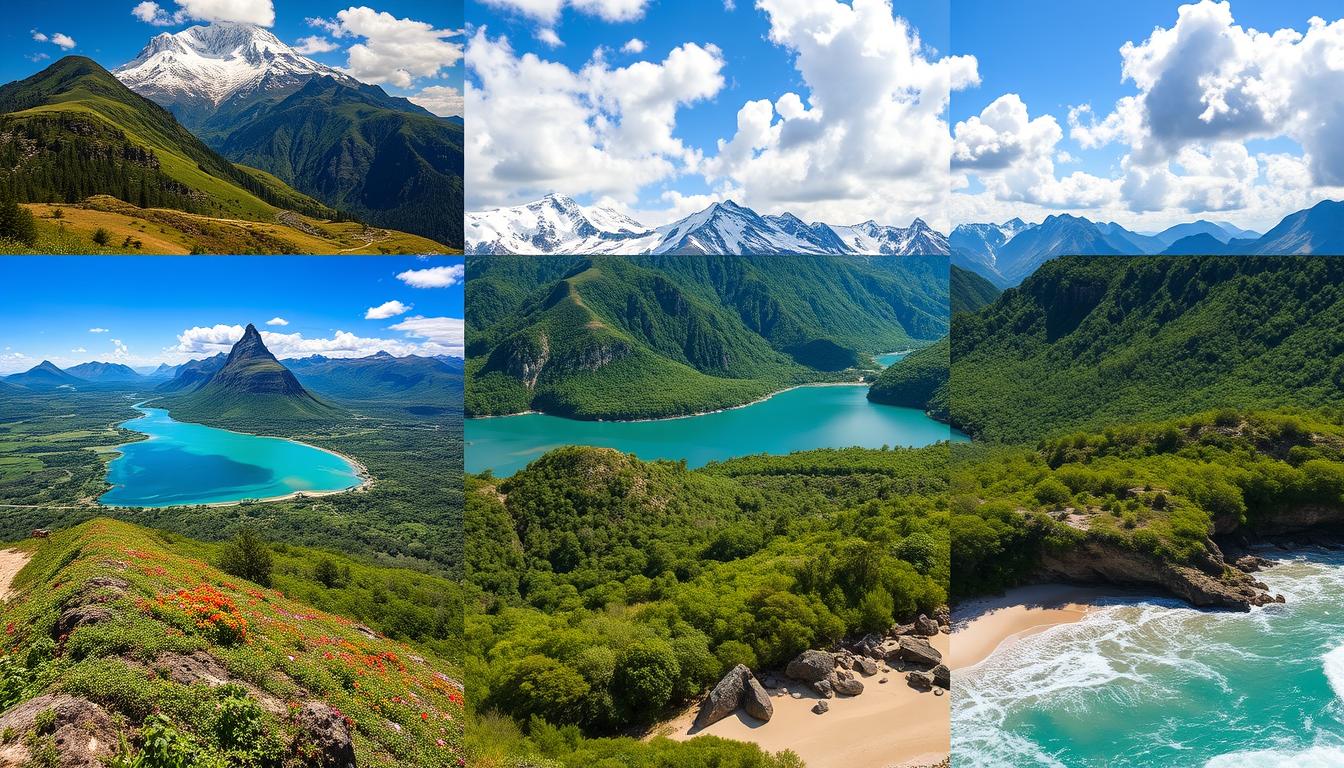
Adventure seekers have many exciting places to explore worldwide. Each spot offers unique landscapes, cultural experiences, and chances for adventure. For example, Peru has the Inca Trail and diverse Andean and Amazon areas. Meanwhile, Patagonia is known for its glaciers, mountains, and untouched wilderness.
In Europe, Ireland’s Wild Atlantic Way is a stunning coastal path. Croatia and Montenegro have beautiful Adriatic coastlines. Colombia’s coffee region offers rolling hills and farm visits. These places are ideal for those who love to explore and make lasting memories.
“The world is a book, and those who do not travel read only a page.” – Saint Augustine
Traveling through the Andes, the Amazon basin, or Peru’s altiplano is a special way to connect with nature and cultures. Places like Ireland’s West Coast, Croatia’s Coastline, and Portugal’s Wine Region also offer chances for adventure and learning.
Adventure travel lets people step out of their comfort zones. It helps them grow, become more resilient, and appreciate the world more. By going on these adventures, travelers can make memories and find hidden treasures that regular tourists might miss.
The Benefits of Adventure Travel
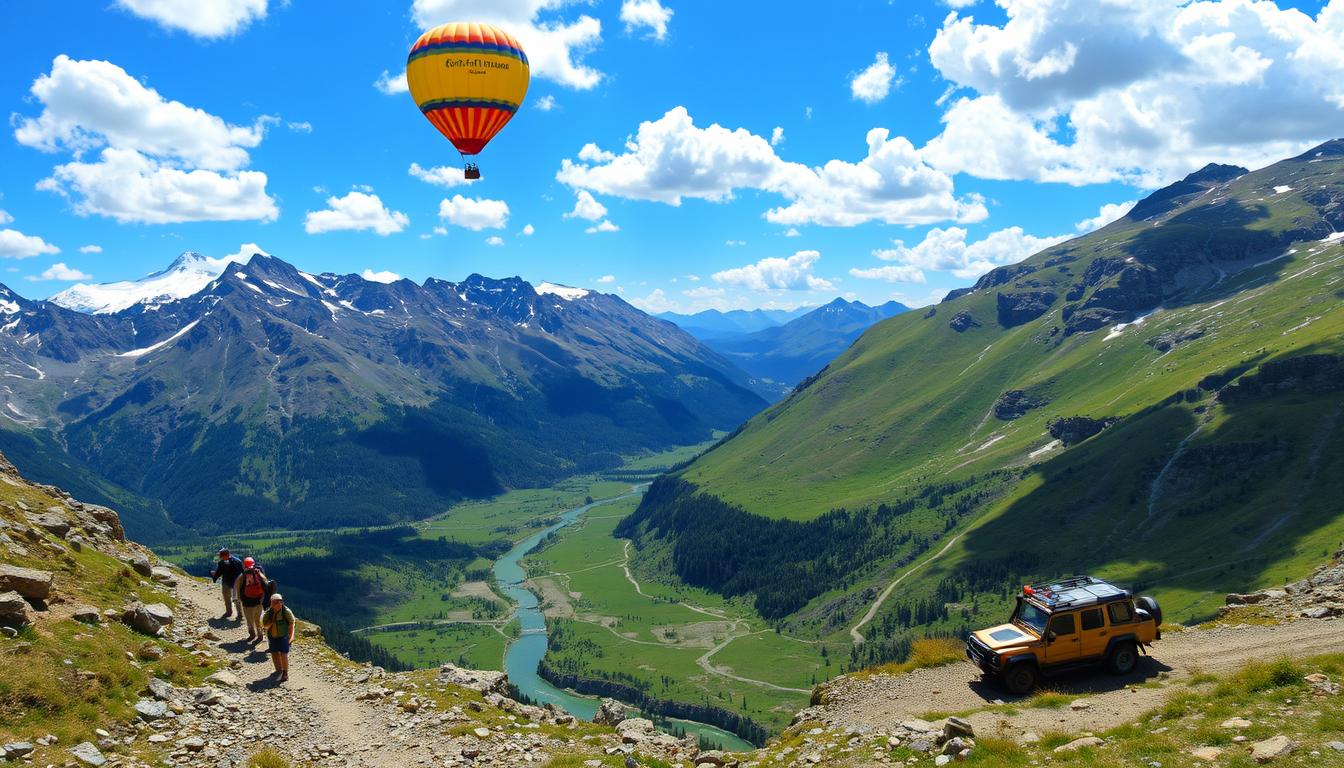
Adventure travel offers many benefits beyond the excitement of the journey. It improves physical and mental health, boosts personal growth, and supports the environment. The lasting impact of adventure travel is truly transformative.
Physical Activity and Mental Health
Activities like hiking, kayaking, or rock climbing make you fitter and reduce stress. Research shows that being in nature and pushing yourself physically can lower stress hormones. It also improves mood and sharpens your mind.
Sense of Accomplishment and Self-Awareness
- Completing a tough adventure boosts your confidence and self-awareness.
- Overcoming challenges gives you pride and empowerment, positively changing your life.
Skill Development and Social Connections
- Adventure travel lets you learn new skills, like navigation or outdoor survival.
- Sharing these experiences with others creates lasting friendships and a sense of belonging.
Ethical and Sustainable Travel
Responsible adventure travel benefits local communities and the environment. It supports conservation and boosts the local economy. This way, travelers help preserve the places they visit.
In conclusion, adventure travel’s benefits are vast and profound. They deeply affect both the traveler and the places they explore.
Also Read : What Is Student Travel Insurance And Why Do You Need It?
Conclusion
Adventure travel has grown from a rare activity to a popular industry. It offers unique and life-changing experiences to people all over the world. This type of travel combines physical activity, cultural experiences, and connecting with nature.
Travelers can try new things and make lasting connections with their surroundings. Whether it’s hiking in the Andes or exploring local foods, adventure travel brings a sense of discovery. It also helps local communities and the environment when done right.
The adventure travel industry keeps getting better, thanks to new technology and a focus on being green. This means more amazing experiences are waiting for those who want to see the world in a new way. Adventure travel is perfect for those looking for more than just a holiday.
FAQs
Q: What is adventure travel and what makes it unique?
A: Adventure travel is a type of travel experience that involves exploration and often includes physical activity. It is unique because it focuses on discovering new destinations and engaging in thrilling activities rather than traditional sightseeing. Adventure travel takes you off the beaten path to experience the culture, nature, and adventure of a location.
Q: What types of activities can I expect on an adventure tour?
A: On an adventure tour, you can expect a variety of activities such as hiking, biking, kayaking, or even wildlife safaris. These active adventures allow you to immerse yourself in the environment and can include excursions to national parks or less traveled destinations.
Q: How do I choose the right travel style for my adventure trip?
A: Choosing the right travel style for your adventure trip depends on your interests and comfort level. If you prefer a more structured itinerary, group tours offered by travel companies like Exodus Adventure Travels may be ideal. If you enjoy spontaneity, consider small group tours that allow for more flexibility.
Q: What should I know about dietary restrictions when booking an adventure tour?
A: When booking an adventure tour, it’s important to inform your trip leaders of any dietary restrictions you may have. Most travel companies strive to accommodate various dietary needs, ensuring that you enjoy your meals while traveling.
Q: Are there expert guides available on adventure trips?
A: Yes, adventure trips often include experienced guides or local guides who are knowledgeable about the destination. These guides enhance your travel experience by sharing insights about the local culture, wildlife, and geography, making your journey more enriching.
Q: What are some popular destinations for adventure tourism?
A: Popular destinations for adventure tourism include Costa Rica, the Galapagos Islands, and various national parks. These locations offer a range of activities and breathtaking scenery, making them perfect for adventurers looking for the adventure of a lifetime.
Q: How can I ensure safety during my adventure travel excursions?
A: Ensuring safety during your adventure travel excursions involves choosing reputable travel companies with qualified trip leaders and guides. Always follow their instructions, stay within designated areas, and be aware of your surroundings to ensure a safe and enjoyable journey.
Q: What is the significance of group travel in adventure tourism?
A: Group travel in adventure tourism allows you to share experiences with fellow trip members, fostering camaraderie and enhancing the adventure. It also provides a sense of security, as you’re traveling with others who share your passion for adventure.
Q: What can I expect in terms of accommodation on an adventure trip?
A: Accommodation on an adventure trip varies based on the itinerary but can include anything from camping in the wilderness to staying in eco-lodges or hotels. Each option is selected to enhance your travel experience and immerse you in the local environment.

